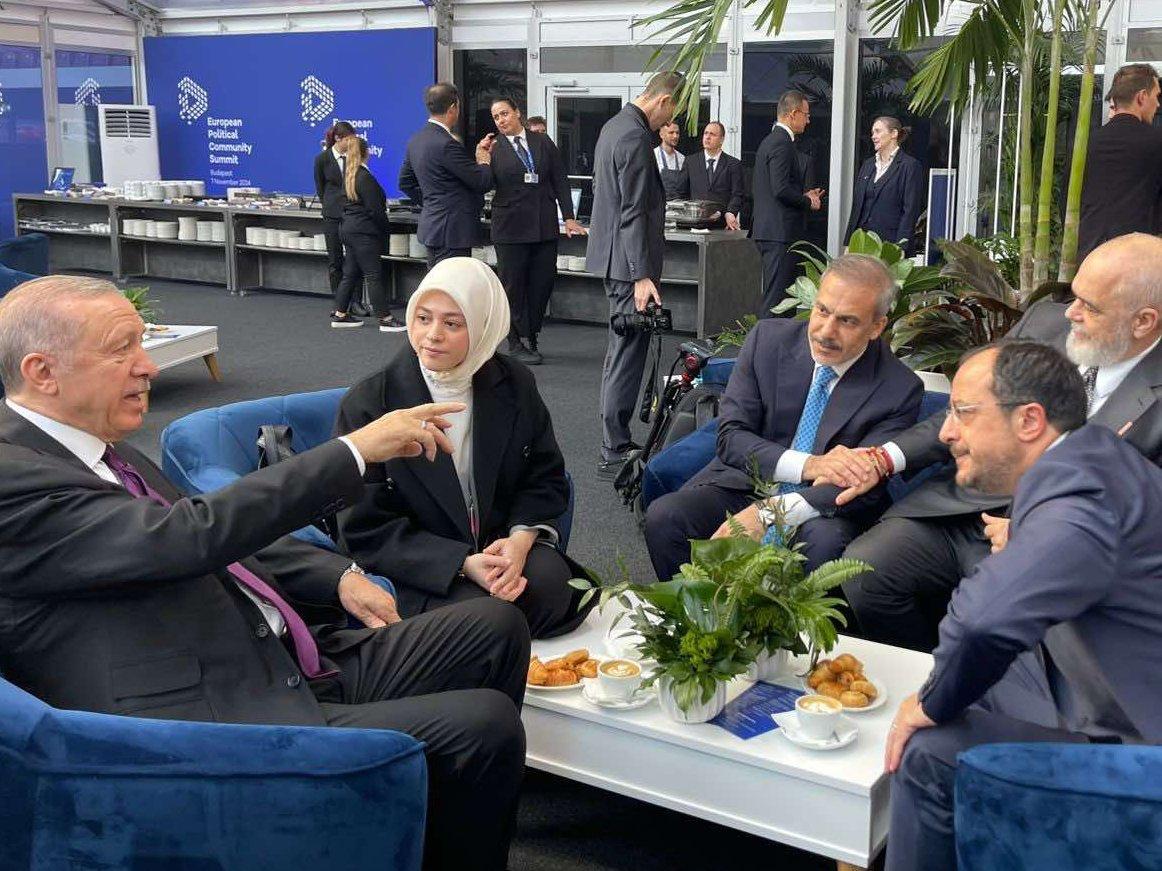President Nikos Christodoulides and Turkish President Recep Tayyip Erdogan met in person in Budapest ahead of the European Political Community’s summit in the Hungarian capital on Thursday.
Christodoulides and Erdogan were pictured in conversation ahead of the event, before then Christodoulides was pictured with Turkey’s Foreign Minister Hakan Fidan, and then being pictured sat down around a coffee table with Erdogan, Fidan, Albanian Prime Minister Edi Rama, Greek Prime Minister Kyriakos Mitsotakis and a member of Erdogan’s communications team.
The European Political Community (EPC) is an intergovernmental forum for political and strategic discussions about the future of Europe, established in 2022 after the Russian invasion of Ukraine.
Speaking to media, Christodoulides said he and Erdogan had an informal discussion, during which he mentioned “several times” to the Turkish leader that the resumption of Cyprus talks can only be based on relevant UN resolutions.
Anything outside that framework “cannot even be discussed”, the president said he told Erdogan.
Christodoulides noted that Cyprus is ready to play a constructive role in EU-Turkey relations, but qualified that Turkey’s path to joining the bloc must go through “substantive developments” on the Cyprus issue.
He said he listened to Erdogan’s address to the EPC, where at no point did Turkey’s leader mention the Cyprus problem. Rather, Erdogan spoke about his country’s desire to “come closer to the EU,” for example join the European Defence Agency.
At the summit itself, Christodoulides spoke on the matter of immigration, saying that asylum seekers now make up six per cent of Cyprus’ population, and that the island’s capacity to take on and host more migrants is “limited”.
He also said the Cypriot government is now “cooperating with international organisations operating in Syria”, including the United Nations High Commissioner for refugees, with the aim of “creating the conditions for the safe and dignified repatriation of Syrians” who are “leaving Lebanon by the hundreds of thousands”.
This initiative comes after the European Court of Justice ruled last month that regions within countries could not be ruled safe if the country as a whole cannot be considered safe, scuppering Cyprus’ plans to declare parts of Syria safe to return migrants.
In addition to his new initiative regarding Syria, Christodoulides also called for “substantial support” for countries in the Middle East, using the €1 billion support package offered to Lebanon by the European Union earlier in the year as an example.
With this in mind, he also said Cyprus is “in favour of actions which lead to the suppression of illegal trafficking, exploitation, and the weaponisation of people”.
As well as migration, the summit’s discussion also centred on matters concerning Europe’s economic security.
Christodoulides’ meeting with Erdogan comes a day after Erdogan and Tatar both attended the Organisation of Turkic States (OTS) meeting in Kyrgyzstan’s capital Bishkek, which was also attended by Hungarian Prime Minister Viktor Orban.
There, Erdogan had said “the Turkic world is responsible for a fair solution in Cyprus,” while Tatar’s attendance of the event drew the ire of the European Union’s High Representative for Foreign Affairs Josep Borrell.
Thursday’s European Political Community meeting is set to be attended by most if not all of its 47 participating states, as well as high-ranking officials from the EU, Nato, the Organisation for Security and Cooperation in Europe (Osce) and the Council of Europe.
On Thursday evening, the 27 EU heads of government will attend an evening meal at the Hungarian parliament building, where they will discuss relations between the EU and the United States in the wake of Donald Trump’s re-election as president, as well as the ongoing situation in the Middle East.
They will then hold an informal European Council meeting on Friday, with the main topic of discussion set to be the future of European competitiveness, based on former Italian Prime Minister Enrico Letta’s report on the future of the European single market and former European Central Bank President Mario Draghi’s report on competitiveness.








Click here to change your cookie preferences